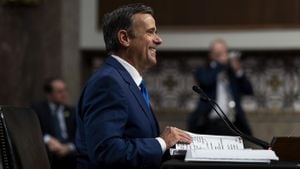TORONTO — Tesla Inc. is raising prices on its Canadian vehicles by thousands of dollars starting February 1, 2025, amid significant shifts in incentives and rising trade tensions. Prices for its Model 3 vehicle are increasing by up to CA$9,000, with prices for its Model Y, X, and S vehicles rising by up to CA$4,000, according to details released on the company’s website.
Tesla did not provide specific reasons for the price increases nor did it respond to requests for comment. The timing of this price hike coincides ominously with U.S. President Donald Trump’s announcement of potential widespread tariffs on Canadian imports, which may begin on the same date. This situation adds to existing tensions between the two countries, leading to speculation about the potential impact on auto sales.
Further complicate matters is the suspension of Quebec's electric vehicle (EV) incentives, which offered rebates of up to CA$4,000 for buyers, and the recent termination of federal EV incentives, once valued at CA$5,000, following the depletion of the program's funding on January 12, 2025. Transport Canada has yet to clarify whether these incentives will be reinstated or when such decisions might occur, leaving prospective buyers anxious about the financial realities of acquiring a Tesla.
The company had raised prices just weeks earlier, adding CA$1,000 to the Model 3 and Model Y prices, effectively pushing these vehicles beyond the CA$55,000 and CA$60,000 thresholds necessary to qualify for federal electric vehicle incentives. This follows additional stipulations imposed last October, when vehicles imported from China and those from countries lacking free trade agreements with Canada lost their eligibility for incentives.
Canada has also imposed 100% tariffs on EVs imported from China, which reflects similar U.S. policies. Regardless of these economic pressures, analysts like Sam Fiorani, vice-president of global vehicle forecasting at AutoForecast Solutions, believe Tesla will successfully navigate the market. He states, “Tesla feels like it’s very comfortable in this market, where much of the competition has relied on the incentives by U.S. and Canadian governments.” He adds, “Tesla sells on its own merits in most cases, and likely can continue to keep its volume up even with the price increases.”
Interestingly, the price adjustments come at a challenging time for the Canadian dollar, which is currently at its lowest value in years. Market experts suggest Tesla's price changes are not something one would typically base on fluctuated currency rates. Fiorani explains, “You don’t make a price change on something could bounce back a month later.” This strategy demonstrates Tesla's adaptable approach toward pricing without heavily leaning on external financial factors.
While many auto manufacturers often implement various incentives and loan options to attract buyers, Tesla's business model predominantly relies on direct sales and transparent pricing without traditional dealership negotiations. “Whereas another manufacturer might offer incentives, rebates and loan incentives,” Fiorani notes, “Tesla works strictly on the price of the vehicle.” This distinct model means Tesla can respond swiftly to market adjustments and policy changes.
Notably, 2023 saw Tesla implementing significant price cuts of up to 20%, allowing the company to qualify for the then-active U.S. and Canadian EV incentives. This historical responsiveness indicates the company’s strategy of adapting to legislative changes swiftly. Nevertheless, the price increases slated for February 1 will undoubtedly alter the buying dynamics, providing only a limited opportunity for potential customers to purchase vehicles at the standing prices before they rise significantly.
The price hikes will apply across Tesla's Canadian lineup, with the Model 3 experiencing the steepest increases. The price surge ranges from CA$4,000 to CA$9,000 depending on the specific trim. For example, the Model 3 Performance will jump from CA$70,990 to CA$79,990, highlighting the substantial financial commitment required from buyers moving forward. The Model Y, Model S, and Model X are set to see consistent CA$4,000 increases across their respective trims. Curiously, the Cybertruck is not affected by these price changes, remaining at CA$165,990 for its highest tier, the “Cyberbeast” model, making it Tesla's priciest option.
This announcement marks a pivotal moment for Tesla's operations within Canada, directly affecting consumer access to its vehicles amid fluctuations within both Canadian and U.S. markets. With the impending tariff challenges and discontinued incentives, February promises to be a significant month for the company's future pricing strategy and sales volume.



